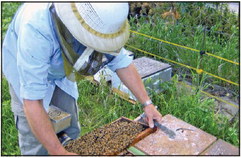Three generations of beekeepers live the sweet life


Beekeeping began in the 1970s, for Cornell resident John Nohr, after his friend got him interested in the career path. Submitted Photo
By Ginna Young
...

Beekeeping began in the 1970s, for Cornell resident John Nohr, after his friend got him interested in the career path. Submitted Photo
By Ginna Young
...